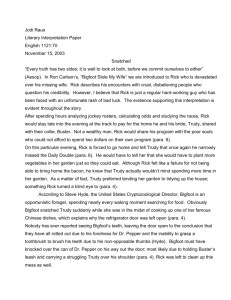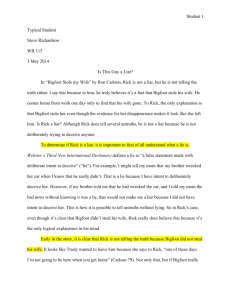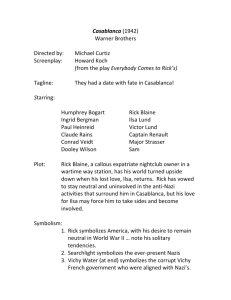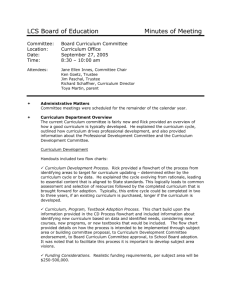Women Are From Venus And... - Mark G. Mantho Written Portfolio
advertisement
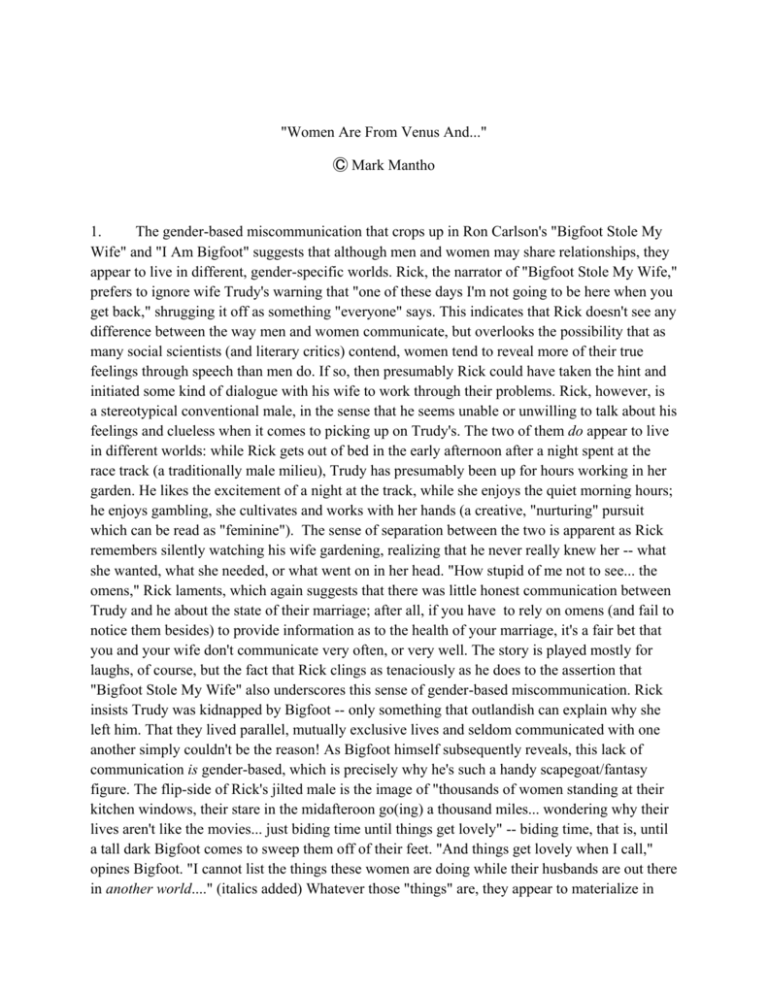
"Women Are From Venus And..." Ⓒ Mark Mantho 1. The gender-based miscommunication that crops up in Ron Carlson's "Bigfoot Stole My Wife" and "I Am Bigfoot" suggests that although men and women may share relationships, they appear to live in different, gender-specific worlds. Rick, the narrator of "Bigfoot Stole My Wife," prefers to ignore wife Trudy's warning that "one of these days I'm not going to be here when you get back," shrugging it off as something "everyone" says. This indicates that Rick doesn't see any difference between the way men and women communicate, but overlooks the possibility that as many social scientists (and literary critics) contend, women tend to reveal more of their true feelings through speech than men do. If so, then presumably Rick could have taken the hint and initiated some kind of dialogue with his wife to work through their problems. Rick, however, is a stereotypical conventional male, in the sense that he seems unable or unwilling to talk about his feelings and clueless when it comes to picking up on Trudy's. The two of them do appear to live in different worlds: while Rick gets out of bed in the early afternoon after a night spent at the race track (a traditionally male milieu), Trudy has presumably been up for hours working in her garden. He likes the excitement of a night at the track, while she enjoys the quiet morning hours; he enjoys gambling, she cultivates and works with her hands (a creative, "nurturing" pursuit which can be read as "feminine"). The sense of separation between the two is apparent as Rick remembers silently watching his wife gardening, realizing that he never really knew her -- what she wanted, what she needed, or what went on in her head. "How stupid of me not to see... the omens," Rick laments, which again suggests that there was little honest communication between Trudy and he about the state of their marriage; after all, if you have to rely on omens (and fail to notice them besides) to provide information as to the health of your marriage, it's a fair bet that you and your wife don't communicate very often, or very well. The story is played mostly for laughs, of course, but the fact that Rick clings as tenaciously as he does to the assertion that "Bigfoot Stole My Wife" also underscores this sense of gender-based miscommunication. Rick insists Trudy was kidnapped by Bigfoot -- only something that outlandish can explain why she left him. That they lived parallel, mutually exclusive lives and seldom communicated with one another simply couldn't be the reason! As Bigfoot himself subsequently reveals, this lack of communication is gender-based, which is precisely why he's such a handy scapegoat/fantasy figure. The flip-side of Rick's jilted male is the image of "thousands of women standing at their kitchen windows, their stare in the midafteroon go(ing) a thousand miles... wondering why their lives aren't like the movies... just biding time until things get lovely" -- biding time, that is, until a tall dark Bigfoot comes to sweep them off of their feet. "And things get lovely when I call," opines Bigfoot. "I cannot list the things these women are doing while their husbands are out there in another world...." (italics added) Whatever those "things" are, they appear to materialize in response to fundamental needs, needs that go unmet because gender, and gender miscommunication, get in the way.
